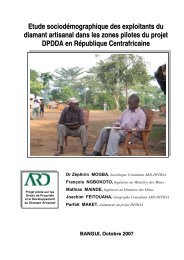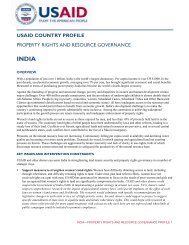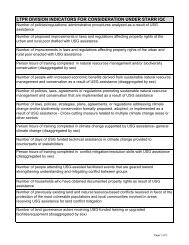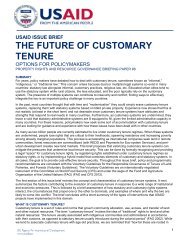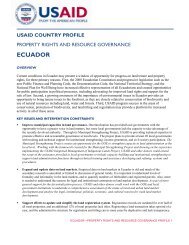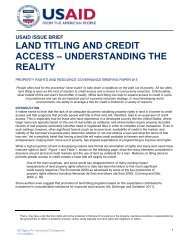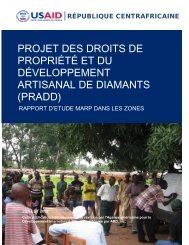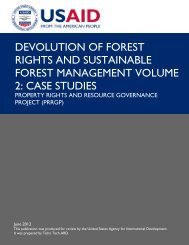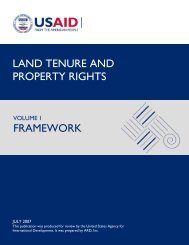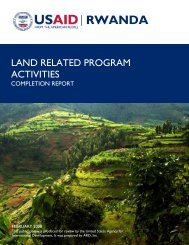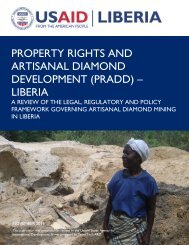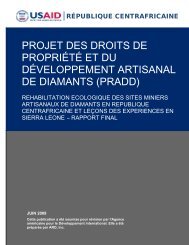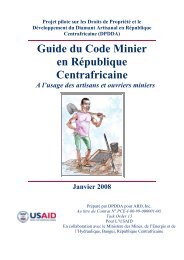the role of property rights in natural resource management, good ...
the role of property rights in natural resource management, good ...
the role of property rights in natural resource management, good ...
Create successful ePaper yourself
Turn your PDF publications into a flip-book with our unique Google optimized e-Paper software.
It is precisely ownership and <strong>management</strong> <strong>of</strong> non-land <strong>resource</strong>s that have been <strong>the</strong> most challenged bygovernment policies <strong>in</strong> much <strong>of</strong> West Africa. France imposed laws <strong>in</strong> her West African colonies assert<strong>in</strong>gstate control <strong>of</strong> all <strong>resource</strong>s that did not lend <strong>the</strong>mselves to <strong>in</strong>dividual possession and control, such asstreams, aquifers, pastures, m<strong>in</strong>eral <strong>resource</strong>s, and forests. For example, France <strong>in</strong>troduced <strong>the</strong> first forestcode for West Africa <strong>in</strong> 1935 which established pr<strong>in</strong>ciples such as lists <strong>of</strong> protected species <strong>of</strong> trees, andforest reserves with<strong>in</strong> which preexist<strong>in</strong>g popular use <strong>rights</strong> are circumscribed and ownership <strong>rights</strong> become<strong>the</strong> exclusive reserve <strong>of</strong> <strong>the</strong> state. Such policies, reta<strong>in</strong>ed and usually re<strong>in</strong>forced by most post-<strong>in</strong>dependencegovernments, make it difficult for customary-based common <strong>property</strong> <strong>rights</strong> and <strong>the</strong>ir enforcement<strong>in</strong>stitutions to successfully defend <strong>property</strong> claims and <strong>management</strong> prerogatives (Elbow and Rochegude,1990).Compound<strong>in</strong>g <strong>the</strong> challenge posed to customary common <strong>property</strong> is <strong>the</strong> French <strong>in</strong>stitutional tradition <strong>of</strong>land legislation, dat<strong>in</strong>g from <strong>the</strong> earliest years <strong>of</strong> <strong>the</strong> twentieth century, which couples <strong>the</strong> pr<strong>in</strong>ciples <strong>of</strong> vacanteet sans maître and mise en valeur. The former pr<strong>in</strong>ciple declares that un<strong>in</strong>habited and unused land belongs to <strong>the</strong>state (<strong>the</strong> vast majority <strong>of</strong> land dur<strong>in</strong>g <strong>the</strong> relatively underpopulated colonial period); and <strong>the</strong> latter pr<strong>in</strong>ciplestipulates <strong>property</strong> <strong>rights</strong> to land have validity only where <strong>the</strong> land is put to productive use. Given that <strong>the</strong>lead<strong>in</strong>g productive use (mise en valeur) <strong>of</strong> land <strong>in</strong> more humid areas <strong>of</strong> West Africa was crop cultivation, thisspecific use <strong>of</strong> land, which carried <strong>the</strong> benefits <strong>of</strong> <strong>property</strong> claims recognized by customary and statutory<strong>rights</strong> systems alike, was fur<strong>the</strong>r enforced.As are many customary <strong>property</strong> <strong>rights</strong> systems concern<strong>in</strong>g both land and non-land <strong>natural</strong> <strong>resource</strong>s,Sogoloou’s tenure system reta<strong>in</strong>s a high priority on susta<strong>in</strong>able use <strong>of</strong> <strong>resource</strong>s. In Sogoloou, rice cultivationlocations are selected annually (rotated) with <strong>the</strong> goal <strong>of</strong> prevent<strong>in</strong>g overuse <strong>of</strong> fragile soils. Systems forrotation between rice and o<strong>the</strong>r crops, as well as fallow periods, are ma<strong>in</strong>ta<strong>in</strong>ed to keep <strong>the</strong> soils fertile. Use<strong>of</strong> palm and fruit trees, pasture, and water sources all fall under <strong>the</strong> authority <strong>of</strong> <strong>the</strong> same <strong>in</strong>stitutions, whichmanage <strong>the</strong>m to achieve <strong>the</strong> same susta<strong>in</strong>ability goals.The challenge is how to capitalize on <strong>the</strong> exist<strong>in</strong>g diverse customary <strong>property</strong> <strong>rights</strong> systems <strong>in</strong> <strong>the</strong> context <strong>of</strong>targeted <strong>natural</strong> <strong>resource</strong> and developmental goals. The short answer is, with caution. This is becausecustomary systems are not only difficult for <strong>the</strong> outsider to grasp, but <strong>the</strong>y are also mov<strong>in</strong>g targets s<strong>in</strong>ce thoseresponsible for manag<strong>in</strong>g <strong>the</strong>m constantly f<strong>in</strong>e-tune <strong>the</strong>m to accommodate chang<strong>in</strong>g political, economic, andecological conditions. Customary <strong>property</strong> <strong>rights</strong> systems, moreover, <strong>of</strong>ten enjoy a near monopoly onlegitimacy <strong>in</strong> <strong>the</strong> eyes <strong>of</strong> local users, and <strong>the</strong>refore should not be ignored. A productive strategy to supportvaluable local <strong>in</strong>stitutional capital <strong>in</strong>volves <strong>in</strong>corporat<strong>in</strong>g enabl<strong>in</strong>g frameworks <strong>in</strong>to statutory land tenuresystems that allow flexibility <strong>of</strong> customary systems.It is worth highlight<strong>in</strong>g <strong>in</strong> this regard that customary systems <strong>of</strong>ten <strong>in</strong>volve local-level decision makersaccustomed to ga<strong>the</strong>r<strong>in</strong>g and process<strong>in</strong>g <strong>in</strong>formation from <strong>the</strong>ir environments and <strong>the</strong>n apply<strong>in</strong>g it to adjustthose systems on an as-needed basis. Central governments can shed <strong>the</strong> burden <strong>of</strong> modify<strong>in</strong>g <strong>in</strong>stitutionalarrangements to sets <strong>of</strong> local-level decision makers, most <strong>of</strong> whom have strong <strong>in</strong>centives (e.g., concern for<strong>the</strong> welfare <strong>of</strong> <strong>the</strong>ir children and grandchildren) to keep customary systems “healthy.” This can free up central<strong>resource</strong>s to (i) provide extension support to actors <strong>in</strong> customary systems so that <strong>the</strong>y can cont<strong>in</strong>ue toenhance/preserve <strong>the</strong>ir production systems; and (ii) provide modest but regular supervision to countertemptations (to which local elites might succumb) to modify customary systems over time <strong>in</strong> ways thatpr<strong>in</strong>cipally benefit <strong>the</strong>ir children and grandchildren at <strong>the</strong> expense <strong>of</strong> o<strong>the</strong>rs’ <strong>of</strong>fspr<strong>in</strong>g. Note that devolv<strong>in</strong>gauthority for adjust<strong>in</strong>g customary systems to local decision makers engaged <strong>in</strong> those systems radically reduces<strong>the</strong> transaction costs which o<strong>the</strong>rwise <strong>of</strong>ten serve as powerful impediments to timely adaptation.There are two general approaches to build<strong>in</strong>g on customary systems: wholesale formalization <strong>of</strong> exist<strong>in</strong>g<strong>rights</strong>; or a phased, monitored, and managed series <strong>of</strong> encounters between formal and <strong>in</strong>formal systems. Thelong-stand<strong>in</strong>g <strong>in</strong>itiative <strong>in</strong> Niger to elaborate a comprehensive Rural Code based on customary <strong>rights</strong>represents <strong>the</strong> former approach. Launched <strong>in</strong> 1985, <strong>the</strong> code’s framework was enacted <strong>in</strong>to law <strong>in</strong> 1993. In <strong>the</strong>meantime <strong>the</strong>re was much jockey<strong>in</strong>g for position among customary <strong>rights</strong> claimants once <strong>the</strong> word was outthat <strong>rights</strong> were to be frozen (Lund, 1995). Groups with privileged access to power, education, or <strong>in</strong>formationROLE OF PROPERTY RIGHTS IN NRM: GOOD GOVERNANCE AND EMPOWERMENT OF THE RURAL POOR 23



